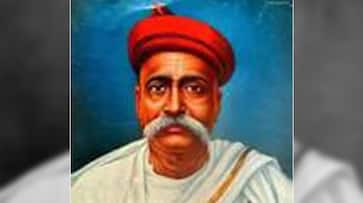'Swaraj is my birthright and I shall have it'
Prime Minister Narendra Modi paid rich tributes to Lokmanya Bal Gangadhar Tilak on his birth anniversary. The Prime Minister said, “I bow to Lokmanya Tilak on his Jayanti. He ignited the spark of patriotism among countless Indians. He successfully mobilised people from all sections of society and deepened the connect between our citizens and India’s glorious past. Lokmanya Tilak also emphasised on education.”
I bow to Lokmanya Tilak on his Jayanti. He ignited the spark of patriotism among countless Indians. He successfully mobilised people from all sections of society and deepened the connect between our citizens and India’s glorious past. Lokmanya Tilak also emphasised on education.
— Narendra Modi (@narendramodi) July 23, 2018
An article on Tilak by M Venkaiah Naidu was published on the occasion, the link to which the Vice-President tweeted.
Read my article 'Swarajya to Surajya' published in today's Indian Express on the occasion of Birth Anniversary of Bal Gangadhar Tilak and Chandrasekhar Azad. #FreedomFighters https://t.co/DZE7kSiBmk pic.twitter.com/ZMcKrzN4EO
— VicePresidentOfIndia (@VPSecretariat) July 23, 2018
Several other ministers like Rajyavardhan Rathore and Shivraj Singh Chauhan paid tribute to the social reformer and freedom fighter.
भारतवासियों को स्वराज के लिए लड़ने की प्रेरणा देने वाले महान देशभक्त, शिक्षक और समाजसुधारक 'लोकमान्य' बाल गंगाधर तिलक जी की जयंती पर उन्हें सादर नमन! #BalGangadharTilak pic.twitter.com/5PNKhwT5cC
— Rajyavardhan Rathore (@Ra_THORe) July 23, 2018
स्वतंत्रता सेनानी लोकमान्य #BalGangadharTilak को जयंती पर नमन। "स्वराज मेरा जन्मसिद्ध अधिकार है, और मैं इसे लेकर रहूँगा" का मूल मंत्र देकर देश को स्वतंत्रता के लिए जागृत किया। आपके प्रखर विचार युवाओं को अनंतकाल तक राष्ट्र के समग्र विकास में सहभागिता के लिए प्रेरित करते रहेंगे। pic.twitter.com/8C5DWGVP7s
— ShivrajSingh Chouhan (@ChouhanShivraj) July 23, 2018
Here are 11 facts about Tilak that the present generation must know:
· Bal Gangadhar Tilak, a key figure in India’s independence movement was born on July 23, 1856 ,in Ratnagiri (Maharashtra). He died on August 1, 1920, Bombay (now Mumbai).
· Tilak founded the Deccan Education Society in 1884 that aimed at educating the masses, especially in the English language. Tilak resigned after some time to devote more time to the struggle for the nation’s freedom.
· Tilak started two weeklies, Kesari and Mahratta. Kesari was a Marathi weekly while Mahratta was in English.
· In 1890, he joined the Indian National Congress. Tilak and his followers were recognised as the ‘extremist’ wing of the party because of their insistence on going beyond negotiations with the British, which was the modus operandi of the organisation since the era of Dadabhai Naoroji, WC Bonnerjee, etc. However, he was supported by fellow nationalists Bipin Chandra Pal of Bengal and Lala Lajpat Rai of Punjab. The trio came to be popularly referred to as the Lal-Bal-Pal.
· Tilak advocated Swaraj, meaning “home rule” or independence in internal matters. It was a prelude to Poorna Swaraj (complete independence) that the Congress would demand in the subsequent decades.
· It was Tilak who motivated Maharashtrians to turn Ganesha Chaturthi into a mass-scale celebration in 1893. He was the one who transformed the household worshipping of Ganesha into a grand public event inciting a sense of unity among Indians. The idea was to develop mutual bonhomie in Maharashtrian society, the ethos that would enhance the fight for freedom from the British rule.
· In 1895, Tilak celebrated Shiv Jayanti, the birth anniversary of Chhatrapati Shivaji on a large scale to build an inspiring nationalist sentiment.
· The Swadeshi movement started by Tilak entailed boycotting goods manufactured abroad — while often based on the raw materials procured from India — and supporting only Swadeshi goods. Mahatma Gandhi took the idea forward during the non-cooperation movement.
· Tilak was tried on the charge of sedition Charges thrice by the Colonial government — in 1897,1909, and 1916. He was sentenced to jail for six years in Burma.
· Throughout his life, Tilak advocated the cause of women’s education and empowerment. He educated all of his daughters and did not get them married until they were over 16, considered an advanced age for marriage in the 19th century.
· Tilak created a foundation for Gandhi and his non-cooperation movement. Unnerved, the British government branded Tilak as the "Father of Indian Unrest". He gained the title of Lokmanya from his followers. The epithet means one who is loved by the people.
Last Updated Jul 23, 2018, 3:29 PM IST









![Salman Khan sets stage on fire for Anant Ambani, Radhika Merchant pre-wedding festivities [WATCH] ATG](https://static-gi.asianetnews.com/images/01hr1hh8y86gvb4kbqgnyhc0w0/whatsapp-image-2024-03-03-at-12-24-37-pm_100x60xt.jpg)
![Pregnant Deepika Padukone dances with Ranveer Singh at Anant Ambani, Radhika Merchant pre-wedding bash [WATCH] ATG](https://static-gi.asianetnews.com/images/01hr1ffyd3nzqzgm6ba0k87vr8/whatsapp-image-2024-03-03-at-11-45-35-am_100x60xt.jpg)


